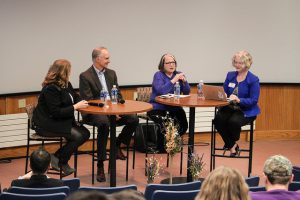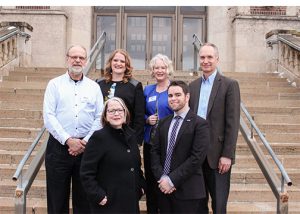On a bitterly cold night in February over one-hundred people gathered for the second-annual Engaged Ethics Conversation (EEC) hosted by the Business Administration department with support from the WSU Foundation.
The EEC is an annual event that brings together students, faculty and members of the community for an insightful and thought-provoking conversation on personal and professional ethics. Designed to give audience members an up-close and personal look at both ethical and unethical behavior from a variety of viewpoints. The goal of the event is to reinforce support for ethical decision-making across the curriculum.
Authenticity
The 2018 theme was “Authenticity: How to be your best self at home, at work, and in public.” Professors Vern Bachor, Jana Craft and Jason Kight, and the event organizers invited a diverse trio of speakers to speak on authenticity from a corporate, academic and personal standpoint.
Kathleen Edmond, a partner at the law firm of Robins Kaplan LLP and former Chief Ethics Officer of Best Buy spoke about authenticity from a balance and boundary standpoint. “There will always be a mismatch between your personal values and workplace values,” Edmond stated. She explained how employees will need to choose what they can live with and what they cannot. Edmond gave examples from her own career and choosing to keep personal and professional lives separate and how that allowed her to be authentic and maintain good boundaries.

Dr. Richard Kyte, an ethics professor at Viterbo University and author of numerous books on ethics and authenticity, spoke from a more theoretical standpoint. “The only way you will truly know yourself is for others to question you,” he stated. Authenticity needs to be cultivated and grounded in your values. Kyte addressed an audience question related to social media and curating an inauthentic identity online. Is it ethical to create an entirely new identity online? His response is that if everyone does this, as a society we create a new norm and it leaves everyone wondering why their lives are not perfect like those of whom they see online. How you present yourself in person and online is an important aspect of authenticity and living a virtuous life.
Anna LeBaron, author of The Polygamist’s Daughter, presented a different facet of authenticity. Growing up in a violent polygamist cult, she described how she was unable to live as a normal child growing up. Her childhood was filled with uncertainty, brutality, abuse, and lies. As a child, she was forced to work for little or no compensation and “there was never enough food.” She was raised and groomed to act and think a certain way and to not question authority. She suppressed her emotions and personality, which meant she was not living an authentic life. Through counseling and reading, she has discovered her true self and that allows her to live an authentic life in full expression of her thoughts, feelings, and emotions. That is why her understanding of authenticity is that it equals freedom.
The audience was encouraged to ask questions live in the audience, tweet questions for the panel and submit questions while viewing the broadcast on Skype. In addition to the over 100 people in attendance, over one hundred also viewed the live broadcast via Skype.
If you missed the event, you can watch the entire event online.

